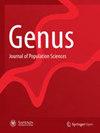Are gender attitudes and gender division of housework and childcare related to fertility intentions in Kazakhstan?
IF 2.1
Q2 DEMOGRAPHY
引用次数: 0
Abstract
Abstract Previous research has found evidence of positive associations between gender-egalitarian attitudes or more equal division of housework/childcare and short-term fertility intentions in developed countries of Europe and East Asia. This study extends the literature to the context of a developing country in the post-communist region—Kazakhstan, which has progressed well in public gender equality but may not have developed private gender equality to the same extent as more developed countries. The study explores how (1) gender attitudes, (2) gender behaviour (housework and childcare division), and (3) consistency between gender attitudes and gender behaviour are associated with fertility intentions in this country. Kazakhstan’s Generations and Gender Survey of 2020 was used for the analyses. The dependent variable was treated as an interval measure, where intentions move along a continuum of certainty. Linear regressions were employed to test the hypotheses. The results show that gender-egalitarian attitudes were negatively associated with short-term fertility intentions for women with two and more children. Likewise, a more equal division of housework was negatively associated with short-term fertility intentions for both women and men, whereas more equal sharing of childcare was negatively associated with men’s fertility intentions. Also, in contrast to studies in more developed contexts, an egalitarian match of gender attitudes and behaviour (either housework or childcare) was negatively associated with short-term childbearing intentions for both women and men. Overall, greater gender equality in the family has a negative relationship with short-term fertility intentions in Kazakhstan. The study provides new and compelling evidence about the relationship between gender equality and fertility in a context that has not previously been studied.在哈萨克斯坦,性别态度和家务和育儿的性别分工是否与生育意愿有关?
先前的研究发现,在欧洲和东亚发达国家,性别平等主义态度或更平等的家务/育儿分工与短期生育意愿之间存在正相关的证据。本研究将文献扩展到后共产主义地区的一个发展中国家——哈萨克斯坦的背景下,这个国家在公共性别平等方面取得了很好的进展,但在私人性别平等方面可能没有发展到与更发达国家相同的程度。该研究探讨了(1)性别态度,(2)性别行为(家务和育儿分工),以及(3)性别态度和性别行为之间的一致性如何与该国的生育意愿相关联。分析使用了哈萨克斯坦2020年代际和性别调查。因变量被视为一个区间测量,其中意图沿着确定性的连续体移动。采用线性回归检验假设。结果表明,性别平等主义态度与有两个或两个以上孩子的妇女的短期生育意愿呈负相关。同样,更平等的家务分工与女性和男性的短期生育意愿呈负相关,而更平等的育儿分担与男性的生育意愿呈负相关。此外,与在更发达背景下的研究相比,性别态度和行为(无论是家务还是育儿)的平等匹配与女性和男性的短期生育意愿呈负相关。总体而言,在哈萨克斯坦,家庭中性别平等程度的提高与短期生育意愿呈负相关。这项研究为性别平等和生育率之间的关系提供了新的和令人信服的证据,这是以前没有研究过的。
本文章由计算机程序翻译,如有差异,请以英文原文为准。
求助全文
约1分钟内获得全文
求助全文

 求助内容:
求助内容: 应助结果提醒方式:
应助结果提醒方式:


